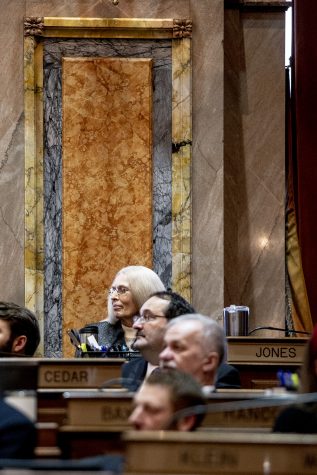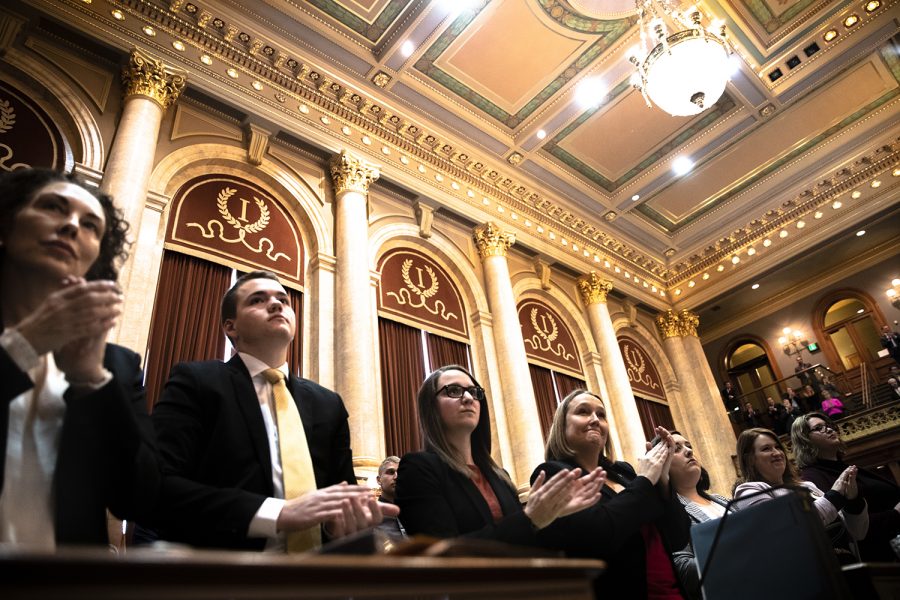Lawmakers plan for return to session amid budget uncertainties
When state lawmakers are able to resume the legislative session in May, passing a budget that deals with COVID-19 concerns, while also fulfilling some of their previous goals, will be their top priority.
House members applaud at the Iowa State Capitol on Monday, January 13, 2020. The House convened and leaders in the Iowa House of Representatives gave opening remarks to preview their priorities for the 2020 session.
April 7, 2020
The top legislative priority when Iowa lawmakers reconvene in Des Moines will be to pass a budget for next year. The current fiscal year ends June 30, but emergency legislation passed in March extends this year’s budget through the end of August.
Lawmakers have been working remotely for three weeks, and with a tentative return date of May 1, legislators will face pressure to pass a budget and coronavirus relief measures with sinking state revenue. That could cast aside key legislative priorities lawmakers were hoping to pass before COVID-19 mitigation efforts derailed the session.
Iowa Senate Majority Leader Jack Whitver, R-Ankeny, said the state budget is a big question mark, and lawmakers are trying to get a grasp on the federal Coronavirus Aid, Relief, and Economic Security Act, or the CARES Act, that President Trump signed March 27.
“We really need to sort through that 800-page bill, figure out how much money would be coming from the federal government, and what we can use that for in this upcoming budget,” Whitver said about the CARES Act.
Lawmakers will be struggling to draft a budget with limited revenue, as sales tax, income tax, and other revenue streams have dried up along with the virtual pause placed on the economy in the midst of the novel coronavirus pandemic.
The CARES act includes $150 billion to be doled out to state and local governments around the country. Iowa will receive an estimated $1.25 billion in federal aid, according to the Tax Foundation.
According to Reynolds’ fiscal 2021 budget estimate, the 2020 budget was around $7.7 billion. The governor’s recommendation for the 2021 budget was a little over $8 billion. The recommendation predicted $8.2 billion in net revenue for 2021, and it’s unclear how much lower actual revenue will be.
Right now, lawmakers are scheduled to return to the Statehouse on May 1, but Whitver said in the event the session has to be pushed as far as August, remote voting could potentially become an option, but he said he doesn’t want remote voting to become a new normal.
“If we do go down that road, I would only be supportive of that if we did it for a very short term, just for this situation, and not get into a situation where remote loading becomes the norm,” Whitver said. “I don’t think that would be a productive way for us to do our business, but in the case of emergency, that’s something that we could potentially talk about in a few weeks.”
Whitver said he suspects moving forward on legislation that would help fund adult and children’s mental-health systems will be a priority for most lawmakers when returning to the Statehouse. He added that improving mental-health systems is more important than ever in the midst of a global crisis.
Reynolds’ Invest in Iowa Act, which she touted during her Condition of the State address in January, would raise sales tax by one cent and allocate a portion of that money to mental-health services. With that revenue, the state would pay for 70 percent of mental-health expenses in each county.
RELATED: Reynolds signs bill granting her increased spending power, emergency provisions to combat COVID-19
Iowa’s economic development director said last week that Reynolds’ plan to boost mental-health funding through her proposal for a one-cent sales tax increase is likely dead for this session amid COVID-19 concerns, according to a report from Iowa Capital Dispatch.
Constituent work has become a main focus for many legislators working remotely. Iowa Rep. Bobby Kaufmann, R-Wilton, said in addition to working some eight-hour days on his farm, he has been busy taking phone calls from Iowans who are concerned about things ranging from health care to unemployment.
“I’m getting dozens of requests per day from people ranging from business loans to, you know, what’s the regulation on this or what do I do about that,” Kaufmann said. “And so I’m navigating constituents and all of us, frankly, are navigating constituents through those times.”
Whitver said he has his cell phone to his head almost 24/7 communicating with members of the Iowa House, but also to be available to constituents.

Iowa House members listen at the Iowa State Capitol on Monday, January 13, 2020. The House convened and leaders in the Iowa House of Representatives gave opening remarks to preview their priorities for the 2020 session.
“There’s a lot of constituents with a lot of needs, so we’re doing our best to help answer the questions and the concerns that people have,” Whitver said. “Just be available for when our constituents have a question about what’s going on, or any resources to help, and so that is priority No. 1 for all of us.”
Democrats said their main priorities will include keeping up funding for education and health care, two areas that have seen massive shake ups as the state has taken measures to control the spread of COVID-19.
House Minority Leader Todd Prichard, D-Charles City, said the novel coronavirus spread has exposed financial shortcomings in the hospital system in Iowa, especially in rural hospitals.
“We’ve got a lot of rural hospitals that are in financial troubles, and now they’re being slammed with this pandemic, which has been financially hard for a lot of hospitals across the state,” he said. “And they weren’t coming into this crisis on good financial ground to begin with.”
Kaufmann, chairman of the State Government Committee, said he has been conducting meetings via Zoom, email, and telephone with other lawmakers, trying to work out budget logistics and what they will realistically be able to pursue when returning to the Statehouse in May.
Kaufmann said he does not think the session will last any longer than the two scheduled weeks in May because he said lawmakers are getting done what they needed to accomplish remotely, and found it unlikely lawmakers would agree on a defined extension of the session.
As of now, lawmakers cannot vote on bills remotely, and while the Legislature can decide to extend the session, legislators will only get paid through the originally scheduled May dates.
“Nothing can be voted on until we get back, but that does not mean that we should not have the exact conversation that we would have all had on the floor of the Iowa House,” Kaufmann said. “There’s no reason that we can’t be having those conversations on the telephone.”
Kaufmann said one of his biggest priorities when returning to the Statehouse will be to pass a bill that would give counties the authority to make Emergency Medical Services an essential service. Iowa does not currently consider emergency services to be essential. The bill would give emergency services, such as ambulance and firefighter services, additional funding.
“I don’t think there’s a question in my mind that one of the top budget priorities has to be federal health funding,” Kaufmann said, referring to the funds that will be given to Iowa from the federal government.
Kaufmann said legislators should act conservatively when revising the budget, so that in the event of another disaster, Iowa still has finances available.
April is generally one of the biggest months for state revenue. Around $800 million came into the state’s coffers in April 2019. With the state tax filing deadline extended to July 31 this year, that income could drop significantly.
Estimates for state revenue in March are slightly below March 2019, though that estimate is based on activity before the governor declared a disaster emergency.
The Revenue Estimating Conference will likely meet again before the session resumes to make an estimate for April’s income, Iowa Sen. Joe Bolkcom, D-Iowa City, said. A ranking member of the Senate Appropriations Committee, he said it’s hard to tell right now how much revenue will be hurt, but it will make budgeting difficult no matter what.
“The challenges are, we’re going to have less revenue to fund basic priorities in the state,” Bolkcom said. “… If we lose a few hundred million dollars in state revenue, it makes everything very challenging.”



